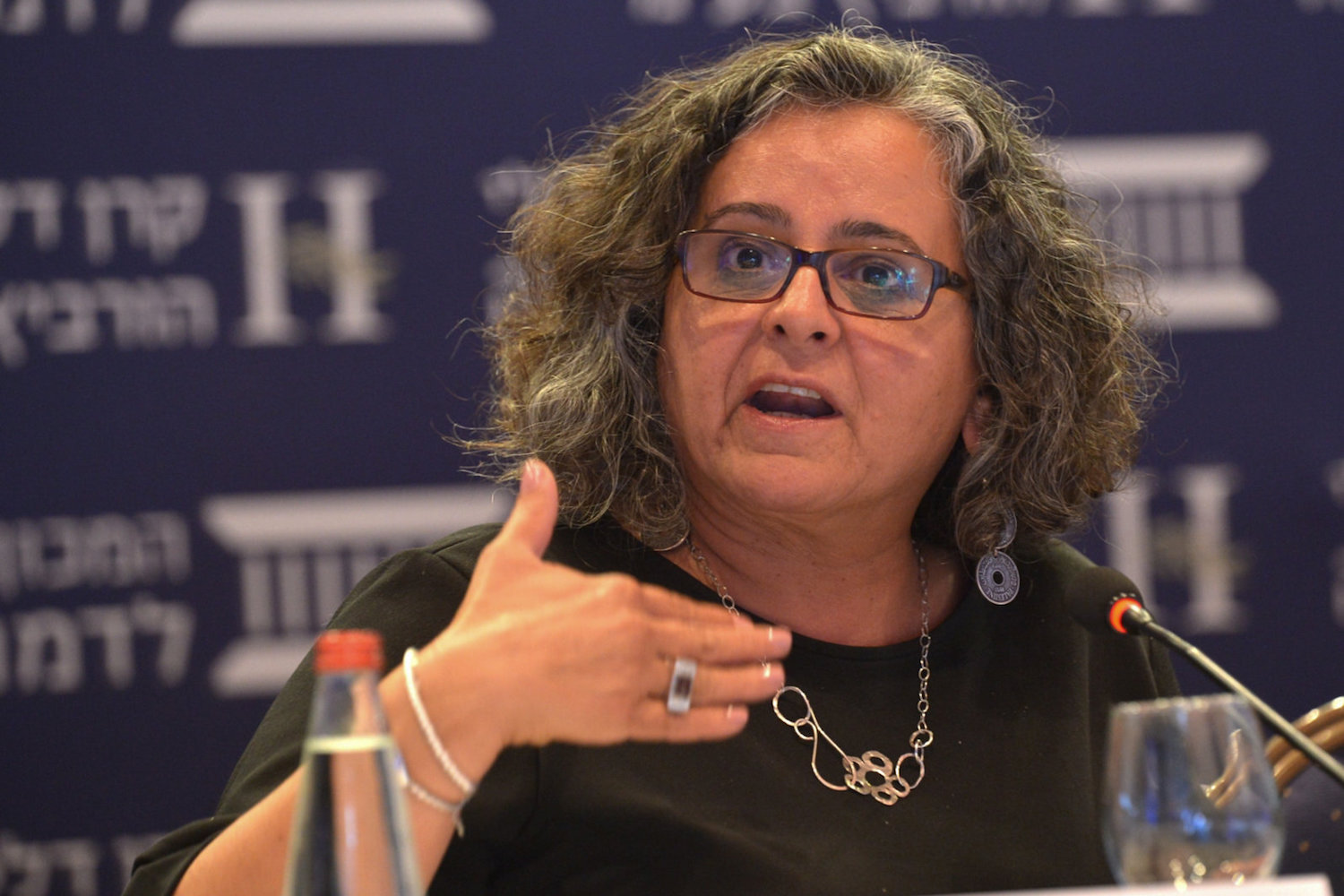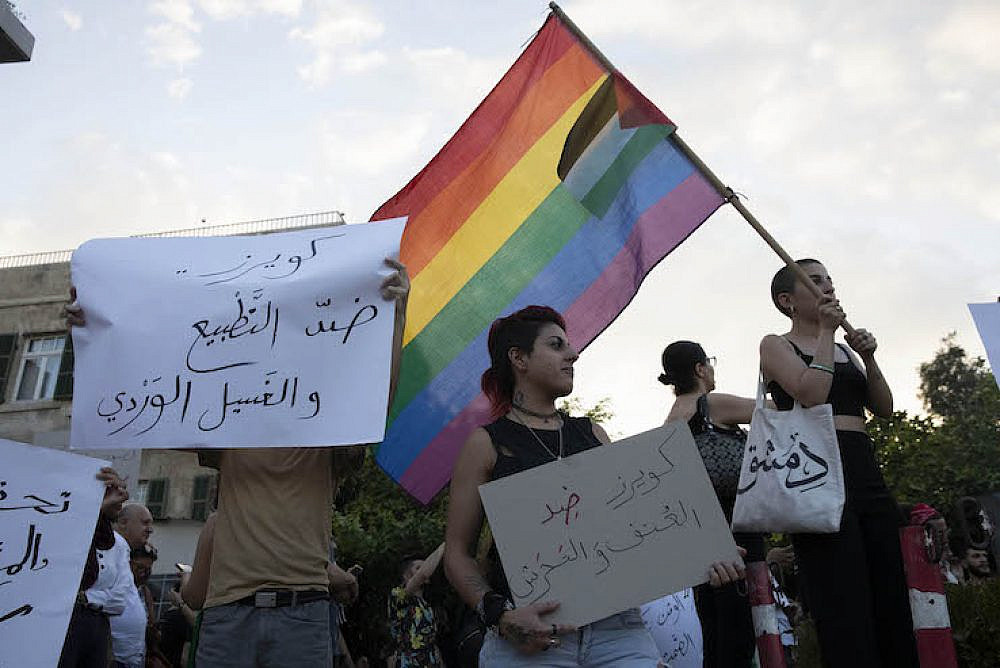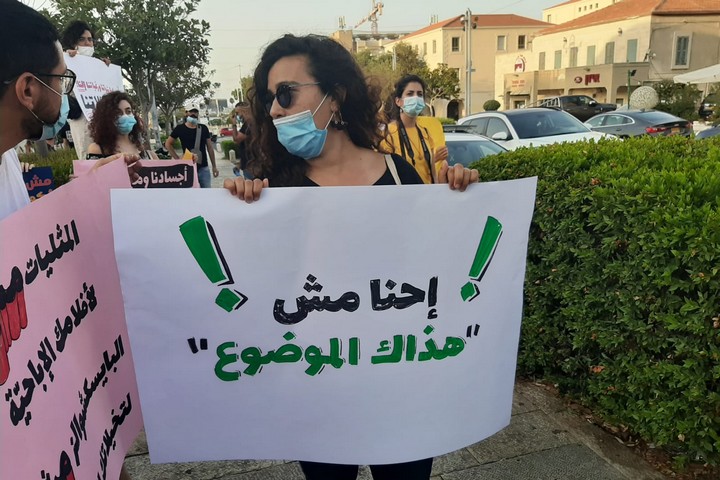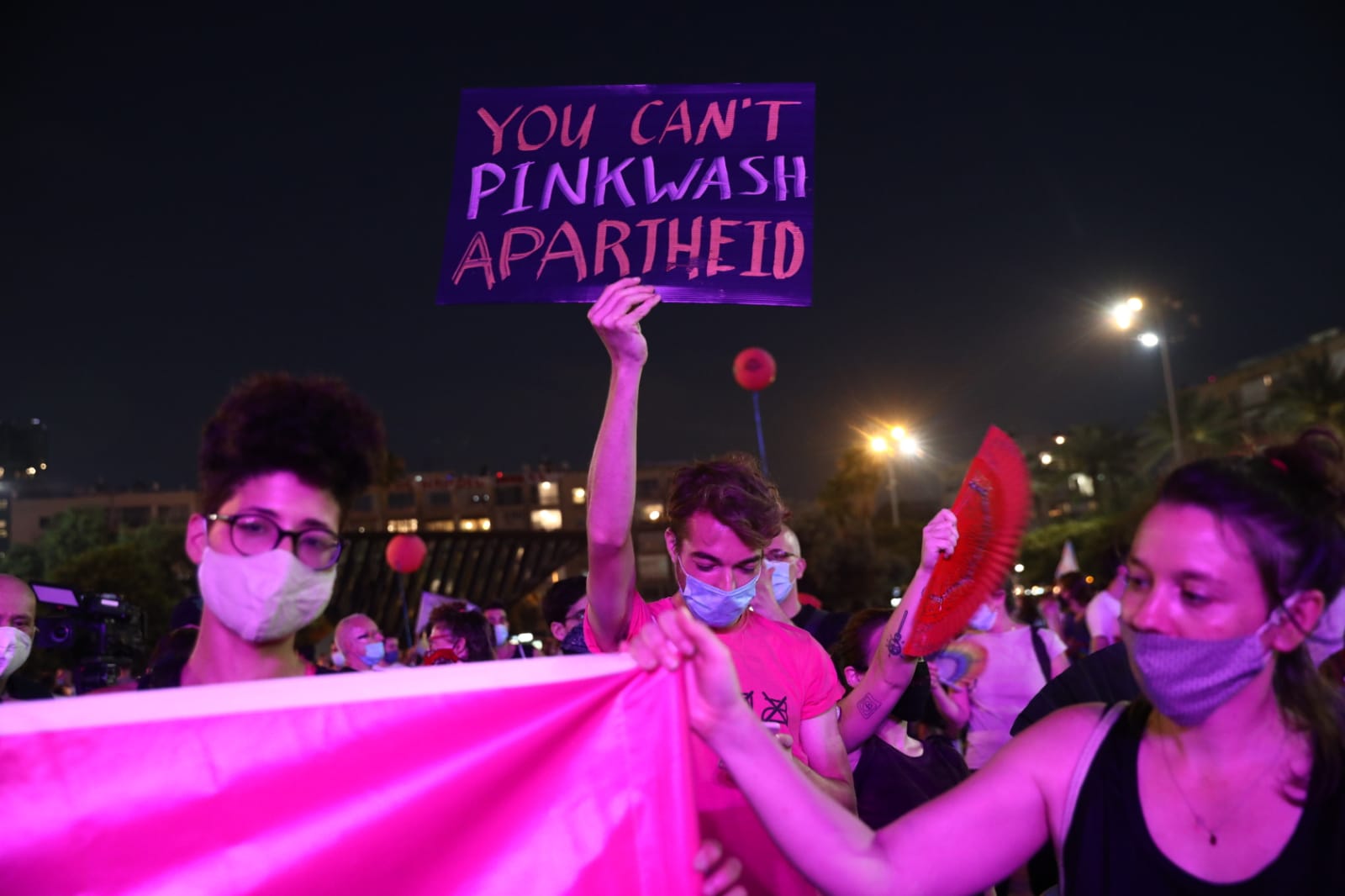It happened all at once, without any coordination. Suddenly, all 150 protesters were on the street — lesbians, gays, bisexuals, transgender, queers, and their allies. All proudly Palestinian, marching from Haifa’s German Colony to the Baha’i Gardens. “A queer cry for freedom,” they chanted.
Courageous and beautiful, the demonstration, which took place last Wednesday and was organized by Palestinian queer organization alQaws, opened up a new chapter in the internal Palestinian discourse on the rights of LGBTQ Palestinians.
“They say ‘out of sight, out of mind,’ look, we are all over Palestine,” the protesters continued.
The protest organizers were not interested in speaking with Israeli media, including +972 Magazine. It is an understatement to say that their experience with Israeli news outlets has been bad. And besides, their message was not aimed at Jewish Israeli readers. The signs, slogans, and speeches — even the protest flyers — were all in Arabic.
The protest was not sparked by a single event, but rather was a show of force in response to a series of events that have had an impact on the LGBTQ community in Palestine and the rest of the Arab world. Some of the more recent events — such as the Joint List’s recent vote on a bill outlawing conversion therapy, and the backlash following the decision of a prominent Palestinian tahini company’s decision to donate to an Israeli LGBTQ rights organization — are still controversial in the Palestinian queer community, and were therefore almost completely absent from the protests’ messaging.
To understand Wednesday’s demonstration and the shift in Palestinian discourse regarding LGBTQ rights, I spoke with three independent activists who were willing to break down the significance of this moment.
Rainbow flags in Kafr Yasif
It has been a turbulent year for the Palestinian LGBTQ community and the Middle East writ large. In July 2019, a queer Arab teen was stabbed by their brother outside the Beit Dror center for LGBTQ youth in Tel Aviv. Weeks later, activists organized the first-ever Palestinian LGBTQ protest in Haifa. Around then, the Palestinian Authority began targeting alQaws, banning the organization from operating in the West Bank.
In May this year, famed Egyptian actor Hisham Selim publicly praised his transgender son, Nour. That same month, Ayman Safieh, a talented dancer and a leading member of the Palestinian queer community, drowned in a beach south of Haifa. In June, Sara Hegazy, an LGBTQ rights advocate from Egypt, took her own life. Hegazy had received asylum in Canada after being imprisoned and tortured by Egyptian authorities for flying the rainbow flag at a Mashrou’ Leila concert in Cairo.

“In the last year, we started talking about members of the queer community in the past tense,” says Rauda Morcos, a human rights lawyer who help found Aswat, the first Palestinian organization for queer Palestinian women. “Since we are a small community that is still growing, it hasn’t happened before. Before Ayman [Safieh], there was Maya Haddad [a trans woman who died by suicide last January, a year after surviving an attempted murder], and after her there was Nada Zaituni, a wonderful Egyptian activist who died of cancer at age 30.”
Morcos noted that Safieh’s funeral showed a positive shift in how the Palestinian community treats its LGBTQ members. Alongside calls to bury queer Palestinians in separate graveyards, she couldn’t ignore the fact that the funeral “felt like a pride parade.”
“I believe Ayman’s spirit could still sense the love of the hundreds of people who came to and from Kafr Yasif [where his family lives]. It was only right that rainbow flags were waved across town on the day of his funeral, but we also can’t take that for granted,” Morcos says.
In the last two weeks, the conversation on LGBTQ Palestinians grew even more heated after Julia Zaher, the owner of the Nazareth-based Alarz tahini company made a donation to The Aguda – Israel’s LGBTQ Task Force. The reactions were complicated. Conservative members of the Palestinian community boycotted Alarz and called others to follow suit. Some queer Palestinian organizations saw the donation as a PR stunt aimed at Jewish customers (Alarz tahini sales have indeed increased since then, despite the calls for boycott), and believed Zaher should have supported a Palestinian organization instead. Then there are those who fully support Zaher and her decisions.
Respect won’t come from the Knesset
“Even though I disagree with Julia Zaher’s actions, you can see how the community responded,” says Nisreen Mazzawi, a feminist activist, social science researcher at Haifa University, and co-founder of Aswat. “Many Palestinians defended her decision, including well-known activists and public figures.”
“I don’t think this could have been possible 20 years ago, and it is a sign of success,” Mazzawi continues. “These supporters didn’t just appear out of thin air. They are a result of 20 years of work that organizations like Aswat and alQaws have been doing, as well as LBGTQ organizations in the Arab world.”
In late July, a bill against conversion therapy passed a preliminary hearing in the Knesset. Of the Joint List’s representatives, only three — Ayman Odeh, Aida Touma-Sliman, and Ofer Cassif, all from the left-wing Hadash party — voted in support of the bill, while all four of the Islamic Movement MKs voted against. Two Hadash MKs and all parliamentarians from the Balad and Ta’al parties were absent from the vote.
Touma-Sliman has been known for her courageous support of the Palestinian LGBTQ community since 2007, when Aswat organized a conference for Palestinian lesbians. She has also been vocal in Arabic media about her support for the bill and for queer rights more generally.

But freedom for LGBTQ Palestinians “won’t come from the Knesset or from laws enacted there,” says Mazzawi. “The debate over the conversion therapy law is an internal Jewish-Israeli one,” she added. “Religious opposition to queerness is not based on whether it is a disease, but whether it is a sin. The bill is very much needed because this type of ‘therapy’ definitely exists, but to be honest I haven’t heard about cases in the Arab community of trying to ‘cure’ LGBTQ people. There are other forms of persecution [in the community].”
Mazzawi says that in order to understand the decision of the majority of the Joint List’s Knesset members, one must look to places like Egypt, where the government is using the LGBTQ issue as political ammunition against Islamic movements.
“Secular leaders like [Egyptian President] al-Sisi use the LBGTQ issue to show their people and the world that they are just as Muslim — if not more so — than the Islamic movement,” she says. “They persecute queer people as a political stunt to garner votes. The same thing happened with the Joint List. Their absence from the vote was based on concerns over how their voter base would react.”
The Joint List MKs who were absent or who voted against the bill did not do so based on any principled position, Mazzawi explains, but rather as a political calculation vis-a-vis how the other parties in the list would use the vote against them. “I’m sorry to see that many leaders in our community are not taking a clear, honest, and brave position on this issue, and that all they care about is internal political considerations,” she says.
Liberating the land does not precede queer liberation
Maisan Hamdan, a queer feminist activist, says there is no justifying the silence of the majority of the Joint List on conversation therapy.
“I have no faith in those who demand freedom for a people and want to liberate the land, but are okay with discrimination,” says Hamdan, one of the founders of Urfod, a movement advocating for draft refusal among Druze citizens in Israel [Druze citizens regularly serve in the Israeli army]. “I don’t believe in this hierarchy in which freeing a country comes before freedom for women or LGBTQ people. I believe everyone has the right to live in dignity. We are not only their last priority, but the LBGTQ issue is not even on their agendas. They are silent when we are attacked, as if we are not part of Arab society. How can we have faith in them?
“Personally, the national issue is important to me,” Hamdan continues. “I write about it, I take part in protests, and I believe that my people have a right to be free. But I want freedom for all groups in our society. If they think their silence is protecting them from criticism, I want to tell them that we exist and we are part of Palestinian society whether they like it or not. They can’t shield themselves from criticism because we will criticize them.”
Some say that LGBTQ Palestinians stopped being invisible this past year. Do you sense a shift in the discourse within Palestinian society?
Mazzawi: “There are changes for better and for worse. More people are participating in the conversation, and that is a good thing because parts of the community are now being exposed to perspectives they had never heard before on this issue. At the same time, the more people talk about this subject, the more extreme the positions become.”
Hamdan: “Change is happening thanks to organizations like Aswat and alQaws, which have been advocating on our behalf in the political arena. On the one hand, they reject the way Israel presents LGBTQ issues both internally and to the world, meaning they oppose pinkwashing. On the other hand, they provide a safe space for people. These organizations are very much part of Arab society, which means we have our own safe spaces that are not within Jewish Israeli society.
“The current debate is very important because it presented an opportunity for LGBTQ visibility within Palestinian society, and is more daring than in the past. On the other hand, it is also more likely to subject LGBTQ people to violence, whether verbal or physical, especially at a time when social media has become such a pivotal feature of our lives. In that sense, the debate is scary. But if we focus on the positive aspects, there is a positive change in the sense that this subject is no longer taboo.”
When attacks turn into free publicity
Mazzawi expands on online attacks against the LGBTQ community: “The bullying that sometimes happens on social media is a universal problem, and not one that LGBTQ people face exclusively. It’s very easy to hate on social media because you sit in front of your screen and don’t see the other person. You feel angry and oppressed, so you participate in the bullying and feel like a hero. We should take these attacks with a grain of salt.
“Yet I can’t say that these attacks come out of nowhere. There are Palestinians, whether Muslim or Christian, who interpret religion in a way that hurts others. The first saying in Islam is ‘In the name of Allah, the most beneficent, the most merciful,’ meaning the first thing about Islam is showing mercy. It’s the same in Christianity, turning the other cheek, ‘Let him who is without sin cast the first stone,’ and so on.
“Those who attack others in the name of religion are using faith in a twisted way that serves their goals, they are the same people who attack women in the name of religion. The problem isn’t with religion but with how people interpret it.”
Mazzawi and Morcos see the current debate from a broader historical perspective.
“The discourse in Palestinian society began to change several years ago,” says Morcos. “It isn’t something unique to this year. When we started Aswat, I remember the Islamic Movement issued a boycott against us as well as a fatwa [an Islamic religious legal order] against me personally, because according to them I was ‘the snake’s head.’ They managed to increase Aswat’s publicity, because every month a new article was being written about us and we were asked to comment. We didn’t have to initiate any media appearances ourselves.
“When we organized the conference, there was a wave of objections and incitement like never before, and I say this as a veteran feminist activist. As feminists, we were called traitors for bringing up issues like gender equality and ‘honor killings,’ as if we were importing these values form the West into Palestinian society. When we started Aswat, we were accused of the same thing.”
Since then, the queer and LGBTQ discourse has entered Palestinian consciousness, explains Morcos. Organizations and publications replaced derogatory names with the terminology that Aswat introduced. “We built a new language, a new discourse. Our struggle was with civil society organizations, which have to have a clear and concrete position regarding gender identity,” she added.
What are the particular needs that LGBTQ Palestinians have? How are they different from the needs of Jewish Israeli LGBTQ people?
Mazzawi: “Every LGBTQ person wants their community to accept them for who they are. To be able to live with their family and friends as part of a society and culture that accepts them as they are.
“Regarding LGBTQ Palestinians, we are stateless. Before needing the protection of the state, we need protection from the state. And not just the state — I see oppression, whether conscious or unconscious, also within Israeli organizations. There is no acceptance for Palestinian identity. So how can you free a person when you don’t accept one part of who they are?
“In Palestinian society, you cannot free LGBTQ people if you don’t accept their queerness. In the same way, in Israeli organizations, you cannot free LGBTQ Palestinians if you reject their Palestinianess.
“Today, I don’t see a difference between Israeli civil society and Israel as a state. They are one and the same, especially when we mention Palestinian issues. LGBTQ Israelis identify with the state even before their queer identity, and they will not stand with LGBTQ Palestinians simply because both are queer. They will fight against Jewish homophobes, but when LGBTQ Palestinians enter the picture, Jewish Israelis will stand with other Jewish Israelis. Palestinians will remain on their own.”
What can Jewish LGBTQ and left-wing activists do to support LGBTQ Palestinians?
Hamdan: “First of all, they must not look at us as separate from the Palestinian issue, people, or identity. Our struggle as Palestinians is different from their struggle. Whoever wants to help us must be aware of all the political and national complexities we live, to understand that Israel isn’t really a symbol of freedom and that we do not share a struggle. We live under different layers of oppression.”
Mazzawi: “The only thing Israeli Jews who want to support us need to do is end the occupation. The occupation is your responsibility. As an LGBTQ Palestinian I am under several forms of oppression: national, religious, gender, ethnic, and more. Your part in all these oppressions is my occupation and my Nakba.
“The first thing I demand of the Jewish person who wants to support me is to end the occupation in the West Bank and Gaza,” Mazzawi continues. “The second thing is to take responsibility for the Nakba. The Nakba is not something that happened in 1948 and is over. It continues until today. Life in Arab localities is the result of the Nakba. The crime in Arab communities today is the result of the ongoing Nakba of the Palestinian people, because the state works against me, not to help me. Because it does not try to protect Arab society but rather fight it. Take responsibility for the Nakba and the occupation. I’ll manage with my family, my society, and my people.”
A breath of fresh air
We went back to marching toward Haifa’s Prisoner’s Square. Not a single Knesset member could be seen. The protesters sat on the stairs that envelope the square and listened to a few short speeches.
One of the speeches came with a message of solidarity and sisterhood from an activist with Tal’at, the nascent Palestinian feminist movement that shook Palestinian society last summer with a series of protests against gender violence across the country: “As Tal’at, our feminism comes from the marginalized… These voices build our vision for the kind of justice we want in Palestine and in the world, for safety and liberation for women and queers in all segments of Palestinian society… the oppression we live is also an opportunity for resistance. For joint resistance, for connecting struggles, so we can build a better reality and a better world.”
Drenched in sweat, a moment before we went our separate ways, I asked an acquaintance how the protest was. “Like a breath of fresh air,” she answered.
A version of this article was first published in Hebrew on Local Call. Read it here.



